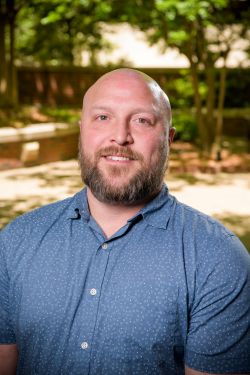 Nicholas Lennemann, Ph.D.Although one might not think that a high school job working in a pizza parlor has commonalities with a career in academia as a molecular virologist, for Nicholas Lennemann, Ph.D., assistant professor in the UAB Department of Microbiology, there was a connection.
Nicholas Lennemann, Ph.D.Although one might not think that a high school job working in a pizza parlor has commonalities with a career in academia as a molecular virologist, for Nicholas Lennemann, Ph.D., assistant professor in the UAB Department of Microbiology, there was a connection.
“While prepping, baking, and slicing up pizza was not my favorite job, I did learn how important an active, collegial, and energetic environment is to being happy and productive,” Lennemann said. After working jobs across several fields that he found “unfulfilling,” Lennemann said he was “elated to discover that a career in molecular biology research was possible.”
“This was only apparent after being fortunate to work with supportive mentors throughout my career,” he added.
In a new paper published in mSPhere, a journal of the American Society for Microbiology, Lennemann reflects on this career journey, highlighting the significance of mentorship and supportive work environments in shaping his career.
Lennemann identifies mentors who played influential roles in his career path, starting with Brian Olson, Ph.D., during Lennemann’s undergraduate studies at Saint Cloud State University. Olson encouraged him to pursue graduate research in molecular virology, leading him to the University of Iowa. There, he focused on filovirus glycoproteins and became interested in the influence of host proteases on viruses under the mentorship of Wendy Maury Ph.D. This interest led him to the University of Pittsburgh for his postdoctoral research with Carolyn Coyne, Ph.D., who encouraged him to pursue research blending his experience in virology with new techniques in cell biology.
He discusses two key studies during this time that shaped his research focus on viral polyprotein processing and host-pathogen interactions: one on dengue virus polyprotein intermediates and another on Zika virus protease activity.
“Collectively, these studies have influenced a major focus of my research on viral proteases encoded by orthoflavaviruses, enteroviruses, and astroviruses, Lennemann explained.
As he considers his current role, it is not only defined by his research, but on educating the next generation in his field.
“I am fortunate to have built a career in academic science with the opportunity to train the next generation of energetic scientists, which will be among the most resilient and perseverant scientists in modern history,” he said.